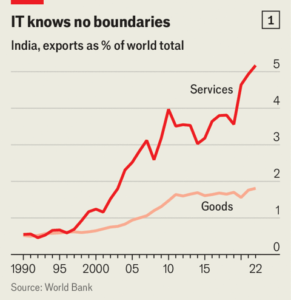
Your browser does not support the <audio> element.
ALIBABA USED to be synonymous with the success of Chinese e-commerce. Lately the company has been synonymous with its woes. In 2021 it became the grimacing face of an official crackdown against China’s biggest technology firms, whose growing size and seeming social indispensability must have spooked the Communist Party. It was fined a record $2.8bn for monopolistic practices that, the government said, were hurting customers and merchants. Its co-founder, Jack Ma, disappeared into self-imposed exile. Rivals such as PDD, which began life as a group-buying platform, and ByteDance, which owns TikTok and its Chinese sister app, Douyin, proved better at catering to thrifty consumers and at adapting to new trends such as “social commerce”, which mixes shopping and showbusiness.
In late 2022 Alibaba’s market value, which two years earlier had exceeded $800bn, fell below $170bn, close to a record low since its blockbuster initial public offering (IPO) in 2014. To reverse the decline, in March last year the company decided to split itself in six. Five firms were spun out: a logistics business (Cainiao), a cloud-computing one (Aliyun), an international e-commerce operation (which contained Alibaba’s main global platform, AliExpress, and a few regional subsidiaries), a digital-services company (which controls Ele.me, a food-delivery app) and a small media group. Alibaba proper retained the domestic retail operation, which is centred around Taobao and Tmall, its two giant marketplaces, and which accounts for nearly 70% of the group’s revenues.
In the past year—and especially since Daniel Zhang was replaced as chief executive in June by Eddie Wu, one of Mr Ma’s co-founders and closest lieutenants—this dismantling strategy has, step by step, been dismantled. First Mr Wu was installed as head of the cloud business, which Mr Zhang took over after the split. Its flotation was called off in November. The following month Mr Wu became head of Taobao. In March he scrapped the IPO of Cainiao, instead purchasing the 36% of it that Alibaba did not already own.
Mr Ma seems to approve. In April he sent a memo to staff, many of whom still revere him. He wrote of rectifying “past mistakes”. He did not say what those were, but many observers took it to mean the troubled break-up plan and struggle to compete with PDD and others. It is easy to dismiss this as Mr Ma’s hubris: no empire-builder likes to see his life’s work undone. Yet staying intact may be the best shot Alibaba has at reviving its fortunes.
The split always looked like a defensive move, designed primarily to placate the party rather than unlock shareholder value. China’s rulers now appear placated, perhaps because a diminished Alibaba no longer looks like a threat or maybe because they have bigger things to worry about, such as a slowing economy. With the target off its back, Alibaba is once again the master of its own fate. That fate is tied to its ability to compete with new e-commerce challengers both at home and abroad. And that ability, in turn, could turn on its logistics and cloud businesses.
Holding on to Cainiao is a bet on the international business. It allows Alibaba to keep parcels flowing smoothly to shoppers anywhere in the world—and, in America and ten other markets, in just five days. This is critical as Mr Wu experiments with a new business model. Alibaba has long been primarily a collection of marketplaces connecting buyers and third-party sellers. A new AliExpress feature, called Choice, involves the firm actually buying products from sellers and shipping them to its foreign buyers.
This is a departure from Alibaba’s original business model. It is reminiscent of Amazon, Shein, a Chinese-born clothing upstart beloved of young Western fashionistas, and to an extent PDD’s thriving American business, Temu (whose sellers agree to strict rules on prices and shipping). It is more capital-intensive—requiring Alibaba to hold its own inventory—but enables better quality control of products shipped to consumers. This is important in rich-world markets, where shoppers expect nothing less, but also in China, where consumers are becoming more discerning. It appears to be working. Choice was behind the 44% year-on-year jump in international revenues in the final three months of 2023.
Whereas keeping Cainiao should help Alibaba compete with Temu and Shein abroad, reintegrating Aliyun is meant to provide a way of countering ByteDance and others at home. The value of goods sold on Douyin and Kuaishou, a rival video app popular in China, is ballooning. TikTok is experimenting with social commerce in foreign markets. Alibaba has no meaningful social-media business, and no plans to create one. Instead, it is trying to retain shoppers by enhancing its customer experience with the help of artificial intelligence. It says more users are trying Wenwen, Taobao’s own ChatGPT-ish AI function, which guides users through purchasing decisions.
Gross merchandise valour
Alibaba has a fight on its hands. Temu and Shein have outspent it on logistics and marketing abroad, especially in America. A big push there could rack up losses and upset jittery investors. In China, the online economy is slowing. S&P Global, a rating agency, expects digital transactions to grow by 8-9% annually over the next two years—faster than GDP but sluggish compared with the average of 13% over the past five years. In the last quarter of 2023 Douyin and PDD’s Pinduoduo platform accounted for 90% of additional sales, reckons Bernstein, a broker. Alibaba lost ground. Chatty AI may not be enough to stop shoppers seeking thriftier options or a bit of social-commerce fun to brighten their days.
Mr Wu may outline his next moves when Alibaba presents its full-year results on May 14th. He may be right that the company is worth more whole than as a collection of separate parts. How much more will depend on factors beyond his control. ■
If you want to write directly to Schumpeter, email him at [email protected]
To stay on top of the biggest stories in business and technology, sign up to the Bottom Line, our weekly subscriber-only newsletter.
















